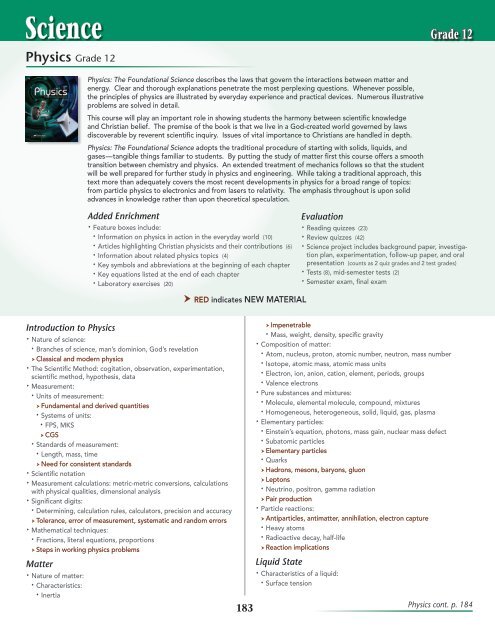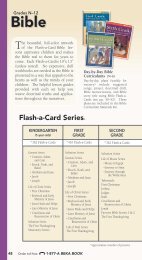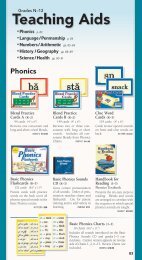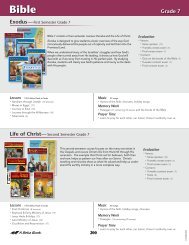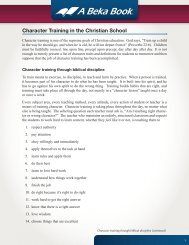Science & Health - A Beka Book
Science & Health - A Beka Book
Science & Health - A Beka Book
You also want an ePaper? Increase the reach of your titles
YUMPU automatically turns print PDFs into web optimized ePapers that Google loves.
´:x>!|¨<br />
00000000<br />
12<br />
®<br />
®<br />
<strong>Science</strong><br />
Physics Grade 12<br />
12<br />
Physics: The Foundational <strong>Science</strong> describes the laws that govern the interactions between matter and<br />
energy. Clear and thorough explanations penetrate the most perplexing questions. Whenever possible,<br />
the principles of physics are illustrated by everyday experience and practical devices. Numerous illustrative<br />
problems are solved in detail.<br />
This course will play an important role in showing students the harmony between scientific knowledge<br />
and Christian belief. The premise of the book is that we live in a God-created world governed by laws<br />
discoverable by reverent scientific inquiry. Issues of vital importance to Christians are handled in depth.<br />
Physics: The Foundational <strong>Science</strong> adopts the traditional procedure of starting with solids, liquids, and<br />
gases—tangible things familiar to students. By putting the study of matter first this course offers a smooth<br />
transition between chemistry and physics. An extended treatment of mechanics follows so that the student<br />
will be well prepared for further study in physics and engineering. While taking a traditional approach, this<br />
text more than adequately covers the most recent developments in physics for a broad range of topics:<br />
from particle physics to electronics and from lasers to relativity. The emphasis throughout is upon solid<br />
advances in knowledge rather than upon theoretical speculation.<br />
Introduction to Physics<br />
• Nature of science:<br />
• Branches of science, man’s dominion, God’s revelation<br />
h Classical and modern physics<br />
• The Scientific Method: cogitation, observation, experimentation,<br />
scientific method, hypothesis, data<br />
• Measurement:<br />
• Units of measurement:<br />
h Fundamental and derived quantities<br />
• Systems of units:<br />
• FPS, MKS<br />
h CGS<br />
• Standards of measurement:<br />
• Length, mass, time<br />
h Need for consistent standards<br />
• Scientific notation<br />
• Measurement calculations: metric-metric conversions, calculations<br />
with physical qualities, dimensional analysis<br />
• Significant digits:<br />
• Determining, calculation rules, calculators, precision and accuracy<br />
h Tolerance, error of measurement, systematic and random errors<br />
• Mathematical techniques:<br />
• Fractions, literal equations, proportions<br />
h Steps in working physics problems<br />
Matter<br />
• Nature of matter:<br />
• Characteristics:<br />
• Inertia<br />
Added Enrichment<br />
• Feature boxes include:<br />
• Information on physics in action in the everyday world (10)<br />
• Articles highlighting Christian physicists and their contributions (6)<br />
• Information about related physics topics (4)<br />
• Key symbols and abbreviations at the beginning of each chapter<br />
• Key equations listed at the end of each chapter<br />
• Laboratory exercises (20)<br />
h red indicates NeW MATerIAL<br />
183<br />
Grade 12<br />
h Impenetrable<br />
• Mass, weight, density, specific gravity<br />
• Composition of matter:<br />
• Atom, nucleus, proton, atomic number, neutron, mass number<br />
• Isotope, atomic mass, atomic mass units<br />
• Electron, ion, anion, cation, element, periods, groups<br />
• Valence electrons<br />
• Pure substances and mixtures:<br />
• Molecule, elemental molecule, compound, mixtures<br />
• Homogeneous, heterogeneous, solid, liquid, gas, plasma<br />
• Elementary particles:<br />
• Einstein’s equation, photons, mass gain, nuclear mass defect<br />
• Subatomic particles<br />
h Elementary particles<br />
• Quarks<br />
h Hadrons, mesons, baryons, gluon<br />
h Leptons<br />
• Neutrino, positron, gamma radiation<br />
h Pair production<br />
• Particle reactions:<br />
h Antiparticles, antimatter, annihilation, electron capture<br />
• Heavy atoms<br />
• Radioactive decay, half-life<br />
h Reaction implications<br />
Liquid State<br />
• Characteristics of a liquid:<br />
• Surface tension<br />
Evaluation<br />
• Reading quizzes (23)<br />
• Review quizzes (42)<br />
• <strong>Science</strong> project includes background paper, investigation<br />
plan, experimentation, follow-up paper, and oral<br />
presentation (counts as 2 quiz grades and 2 test grades)<br />
• Tests (8), mid-semester tests (2)<br />
• Semester exam, final exam<br />
Physics cont. p. 184


